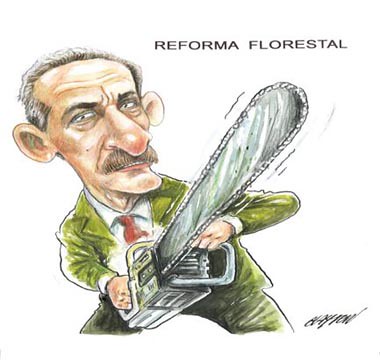
In what may go down as one of the worst environmental crimes of the 21st Century, the Brazilian Senate voted on Wednesday to retain most of the bad changes to the national Forest Code that had passed the House of Deputies earlier this year. Brazil's international commitments to mitigating climate change, maintaining biodiversity and it's status before the upcoming RIO+20 global environmental meetings are now on collision course with the insatiable demand of its agri-business sector. In the coming months the issue will be laid squarely before President Dilma Rousseff who has thus far avoided comment.
re-posted from JustMeans
A revised version of Brazil's Forest Code, a piece of legislation that regulates the use of forest coverage on private properties in Brazil, and whose draft was approved in Congress on Wednesday (23), has sent shockwaves through the sustainability community in the country and abroad.
An incensed debate has gripped the country over the last year, which culminated in yesterday's vote. The new draft, which is designed to meet the requirements of the rural business, has been rushed through the House and the Senate and did not take into account expert opinion from scientists, who object to the new version of the law vehemently.
"The report continues to pardon those who deforested illegally and will promote more deforestation. What used to be an environmental crime now has become fantastic business", said Mrcio Astrini, Greenpeace's head of Amazon campaign.
Scientists have warned the new law will open way for the clearance of more than 175 million acres, or roughly the size of Germany, Italy and Austria combined, which would be come mostly pasture for livestock and soy monocultures to feed cattle, mostly.
This volume of deforestation would release more than 25 billion tons of CO2 into the atmosphere, or four times the goal for global reductions in greenhouse gas emissions under the Kyoto Protocol during 2008-12.
WWF, which has been campaigning against the revised legislation from the beginning of the debate, said the proposed changes severely contradict Brazil's efforts to become an environmental and sustainability leader on the global stage.
"Brazil will be cutting itself off from a growing global market for responsibly sourced goods, in addition to forgoing the countless benefits provided by a healthy Amazon, such as clean air and water, stable weather patterns and various other environmental services", it said.
"We are watching, just before Brazil hosts Rio + 20, a clear attempt to dismantle Brazil's environmental legislation," stated WWF-Brazil's CEO Maria Cecilia Wey de Brito. "This is something unprecedented in our history."
The bill will go back to the House before being sent to President Dilma Rousseff, who can still veto it. "In the next phase, she will have to keep her word to veto or break her campaign promises", said Mr. Gasparini in reference to Ms. Rousseff's promise to not pardon those who have deforested.
The current Forest Code was written in 1965 and requires landowners to keep a certain percentage of their land as untouched forest, from 20 percent in certain areas to 80 per cent in the Amazon. The new laws would give amnesty from heavy fines to landowners who cleared forest illegally between 1965 and July 2008.
Rules related to the clearing of hills would be relaxed and forest areas near rivers would have to be between 100 and 330 feet from the river bank, which conservationists say will are not enough.
A recent report compiled by Imazon and Proforest found that Brazil lags behind other BRIC countries in terms of legislation that protects forest coverage. Compared with China, Russia and India, Brazil loses the race towards sustainability by deforesting more than it reforests.






No comments:
Post a Comment